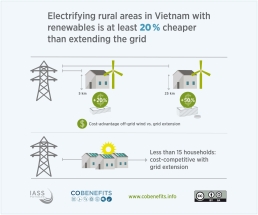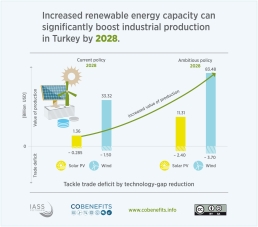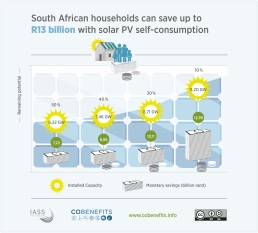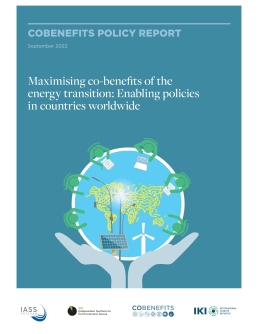19. Oktober 2022
UfU and IASS publish Enabling Policies Report
Practical proposals for the implementation of a fair energy transition
COBENEFITS Project
Term
03/2017-02/2020
Cooperation partners
Institute for Advanced Sustainability Studies e. V. (IASS)
Renewables Academy AG (RENAC)
International Energy Transition (IET)
Commissioned by
Federal Ministry for the Environment, Nature Conservation, Building and Nuclear Safety (BMUB)
as part of the International Climate Initiative (IKI)
Contact
Franziska Sperfeld (e-mail: franziska.sperfeld@ufu.de)
The challenge of transformation
Today’s societies are facing enormous challenges as a result of advancing climate change and the associated transformation processes. In addition to the transformation of mobility and the structural change of other industries, the achievement of agreed climate protection goals depends above all on the success of the energy transition.
The fact that the energy transition requires a comprehensive transformation of our energy grids, electricity generation and storage, and thus naturally poses a challenge, is used by some stakeholders as an argument against the climate-friendly transformation of the energy supply. Wrongly: The Policies Report shows that the energy transition is not only worthwhile in climate terms, but also financially, socially and economically.
The energy transition has positive side effects
In the future, it will be of central importance whether the energy transition is designed to be socially fair. Only then can change lead to lasting acceptance among the population. In our COBENEFITS project, we have therefore investigated to what extent the conversion to a sustainable power supply through renewable energies has positive side effects on other economic and social sectors and how these can be used. For example, a rising share of renewable energy can lead to less air pollution, more energy security and future-proof jobs.
If the energy transition is accompanied by smart legislation and good policies, these positive side effects can be enhanced and fairly distributed among communities. A central finding of the project is: The co-benefits (and thus e.g. savings) mostly arise outside the department that is responsible for planning the energy transition and thus has an additional effort at the beginning. Therefore, it is essential that government institutions cooperate across administrative departments in the future.
The Enabling Policies Report
In order to be able to defend the energy transition against critical voices from within the own economy, policy areapolitics and society, it is of central importance for many countries to back up the above argumentation of positive side effects with scientific studies. This has been done in the COBENEFITS project.
The COBENEFITS Enabling Policies Report is the official final report of the project. It provides an overview of policy measures that have a high potential to fairly exploit the co-benefits of renewable energy in the power sector. The report summarises findings and recommendations from five COBENEFITS project years and more than 15 studies from more than 7 countries. As such, it is a practical tool for policy makers, researchers and policy advisors to think climate change mitigation and socio-economic development together in practice.
Infographics




More infographics of the COBENEFITS project are available here: https://www.cobenefits.info/infographics-gallery-2/



